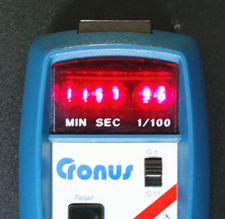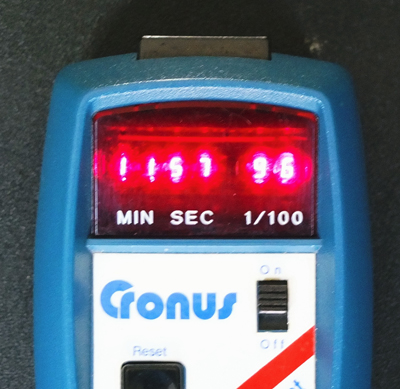
By Michael Krueger
I recently spoke with a prospective client about his current exercise habits. He outlined a vague program of occasional group aerobic activities and even more sporadic and unfocused weight lifting. He said he had been “working out” for more than a year and was very disappointed in the return he was getting for all the hard work he was putting forth. I said that given his lack of intensity, focus, frequency, volume, and consistency, he has gotten exactly the results I would have expected.
…that went over real well.
Reality Bites
Abraham Lincoln is credited with saying, “You can fool some of the people all of the time, and all of the people some of the time, but you cannot fool all of the people all of the time.” He missed one thing though. When it comes to fitness, “You can fool yourself most of the time, all of the time; until you just can’t anymore.”
I have conducted fitness tests on a lot of people. I have seen more exercise and food logs than I care to think about, and the one thing that was true about most of them is that they were works of fiction. The honest, straightforward logs were few and far between.
When I ask clients to keep a journal, they tend to fall into one of four camps. Some lie overtly and some lie but not on purpose, while others write what they want to believe is true and still others write to please me. Everyone has their reasons for the lies they tell, but unfortunately the end result is the same: For the most part, it’s wasted effort and useless data. Well, that’s not entirely true; the data may be useless, but we are both now aware that they don’t have a clue as to how to be honest with themselves.
Keeping a log or a journal is an excellent way to see where you are on track and to highlight the areas that need more attention. A fitness and food journal is a marvelous tool so long as you are honest in you entries. If you don’t wrap them up in energy sucking emotion and can maintain objectivity in your recordings, you will remain nonjudgmental and therefore able to apply the lessons they have to offer. This is the only way to make what you write of any value; fiction, fault finding, and blame aren’t useful.
Most of the time, what you find may not be all that flattering. You may find that you eat like a college student, drink like a fish, and don’t work out anywhere near as much or as hard as you thought you did. So what? If this is your reality, then it is simply your starting point. Judging yourself harshly or pretending otherwise will just delay the achievement of your goals.
New Reality
Can you run 1.5 miles in less than 12 minutes? You might say that you aren’t a runner, so no, you can’t. So, if you happen to need to run at a fire scene, do you simply explain to the assembled crew and victims that you don’t run, or do you just hope and pray it doesn’t come to that? The other option is even worse: You lie to yourself and say that you can in fact run 1.5 miles in less than 12 minutes even though you know it’s not true, and when a real life test does come, you fail miserably and maybe people die.
It is time to face the facts: Statistically speaking, you probably aren’t in top shape. This isn’t a crime, but it is a problem. The crime is if you are in denial about your physical condition. The crime is if you cannot optimally perform when the alarm goes off and yet you do nothing about it. The crime is if you are the weak link in your department’s performance chain. The crime is if someone suffers because you couldn’t be bothered to be honest with yourself and do what’s needed to optimize your physical readiness. This is a fact; this is reality.
Fortunately, this doesn’t have to be your fate. You can take charge of your fitness so that you can boldly state, “Yes, I’m ready; don’t wait for me.” There is no better feeling in the world than knowing without a doubt that you are ready for whatever comes your way. To achieve this state takes personal honesty, responsibility, and a whole bunch of really hard work.
Reality Check
I have no doubt that you are skilled firefighters. You train and train until the movements are second nature. My question is whether you have the physical tools to go with your firefighting skills.
Basic strength and aerobic conditioning are the bare minimum required to perform your job. You would never settle for the minimum skills in firefighting, so why settle for minimum when it comes to your strength and conditioning? The obvious reason is that regular departmental skills assessment is commonplace while regular fitness testing is not.
That doesn’t mean that you cannot choose to personally hold yourself to the highest possible fitness standards. There are many protocols to pick from, and they all give you a high yet achievable mark to shoot toward. There are fire standards, law enforcement standards, and military standards. They all have the basics in common, and if you can achieve any one of them, you will be reasonably fit. Of course, this is only the first step.
Self-Awareness
Once you can do 50 push-ups, 50 sit-ups, and 10 chin-ups and run 1.5 miles in 11:59, you have demonstrated basic fitness. Now where do you go from there? Well, 51 push-ups, 51 sit-ups, 11 chin-ups, and 1.5 miles in 11:58, of course.
Our culture has a tendency to “test and forget.” Once you pass your initial testing, you are good for life, and that is that. The reality is that training or studying just to pass a test doesn’t usually produce a lasting effect. The TV show Are You Smarter than a 5th Grader? is a good example of learning and forgetting. We all learned the answers to the questions posed, but we don’t remember the answers. Fitness is like that. Just because you passed a test 1, 2, or more years ago doesn’t mean you retain that strength and endurance. You can’t just buy fitness; without regular work, it goes away.
Don’t bother looking around your department and assessing the overall physical readiness of others. You can’t do anything substantial about anyone other than yourself. Look at yourself and determine if you can respond at 100% capacity if the alarm goes off right now. If you can’t truthfully answer “yes,” then you’ve got a lot of work to do.
Making It Happen
If you can exercise on your own, do it. If you need the camaraderie of a group, find it. If you haven’t a clue what to do, learn it. If you are already fit, improve it. If you have exercise knowledge, share it. It is up to you to make it happen; that’s what it’s all about.
It’s the right thing to do, so do it.
Michael Krueger is an NSCA-certified personal trainer. He got his start in fitness training while serving in the United States Coast Guard. He works with firefighters and others in and around Madison, Wisconsin. He is available to fire departments, civic organizations, and athletic teams for training, consulting, and speaking engagements. He has published numerous articles on fitness, health, and the mind-body connection and was a featured speaker at the IAFC’s FRI 2009 Health Day in Dallas, Texas. E-mail him at MKPTLLC@gmail.com.

